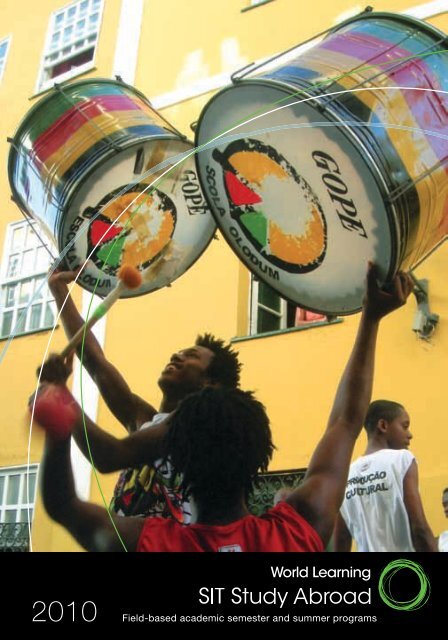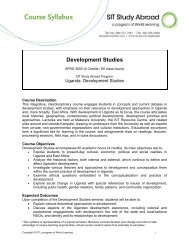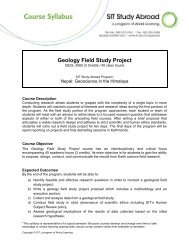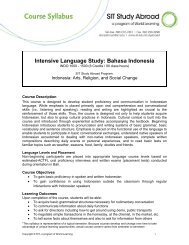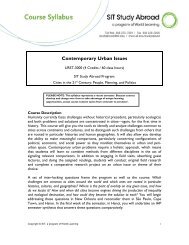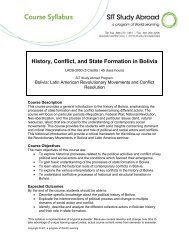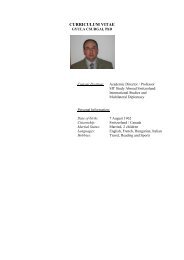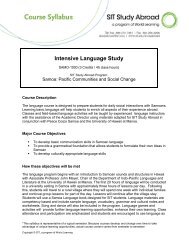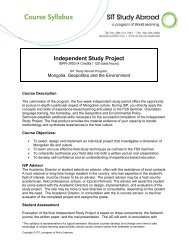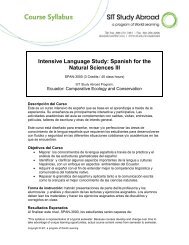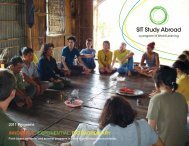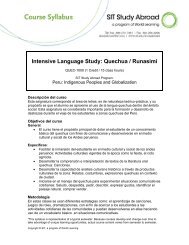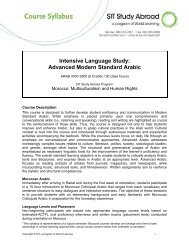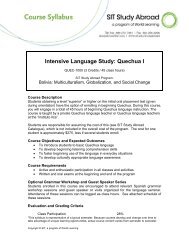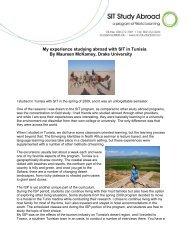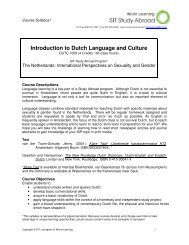2010 Field-based academic semester and summer programs
2010 Field-based academic semester and summer programs
2010 Field-based academic semester and summer programs
You also want an ePaper? Increase the reach of your titles
YUMPU automatically turns print PDFs into web optimized ePapers that Google loves.
<strong>2010</strong> <strong>Field</strong>-<strong>based</strong> <strong>academic</strong> <strong>semester</strong> <strong>and</strong> <strong>summer</strong> <strong>programs</strong>
SIT<br />
Innovative. Experiential.<br />
EXTRAORDINARY.<br />
The SIT Study Abroad experience offers:<br />
■ Rigorous <strong>academic</strong> <strong>programs</strong> through a<br />
field-<strong>based</strong>, experiential approach<br />
■ A focus on critical global issues<br />
■ Undergraduate research through SIT Study<br />
Abroad’s hallmark Independent Study Project<br />
■ Cultural immersion through fieldwork,<br />
intensive language classes, <strong>and</strong> urban <strong>and</strong><br />
rural homestays<br />
■ A small group of students in each program<br />
■ Access to SIT’s extensive local resources<br />
<strong>and</strong> networks<br />
■ A commitment to reciprocity as the foundation<br />
of our educational philosophy
Semester Programs<br />
in Exceptional Locations<br />
SIT has<br />
gone green!<br />
For more details on<br />
these <strong>programs</strong>, please visit our Web<br />
site at www.sit.edu/studyabroad.<br />
Africa<br />
Botswana Community-Based Natural Resource<br />
Management<br />
Cameroon Social Pluralism <strong>and</strong> Development<br />
Ghana Origins of African Identity<br />
Ghana Social Transformation <strong>and</strong> Cultural Expression<br />
Kenya Health <strong>and</strong> Community Development<br />
Kenya Islam <strong>and</strong> Swahili Cultural Identity<br />
Madagascar Biodiversity <strong>and</strong> Natural Resource<br />
Management<br />
Madagascar National Identity <strong>and</strong> Social Change<br />
Mali Health, Gender, <strong>and</strong> Community Empowerment<br />
Morocco Migration <strong>and</strong> Transnational Identity<br />
Morocco Multiculturalism <strong>and</strong> Human Rights<br />
Senegal National Identity <strong>and</strong> the Arts<br />
South Africa Community Health <strong>and</strong> Social Policy<br />
South Africa Multiculturalism <strong>and</strong> Human Rights<br />
South Africa Social <strong>and</strong> Political Transformation<br />
Tanzania Wildlife Conservation <strong>and</strong> Political Ecology<br />
Tanzania Zanzibar—Coastal Ecology <strong>and</strong> Natural<br />
Resource Management<br />
Tunisia Emerging Identities in North Africa<br />
Ug<strong>and</strong>a Development Studies<br />
Ug<strong>and</strong>a/Rw<strong>and</strong>a Post-Conflict Transformation<br />
Asia <strong>and</strong> the Pacific<br />
Australia Rainforest, Reef, <strong>and</strong> Cultural Ecology<br />
Australia Sustainability <strong>and</strong> Environmental Action<br />
China Chinese Culture <strong>and</strong> Ethnic Minorities<br />
Fiji Social Change <strong>and</strong> Ethnic Identity<br />
India National Identity <strong>and</strong> the Arts<br />
India Sustainable Development <strong>and</strong> Social Change<br />
Indonesia Balinese Identity <strong>and</strong> the Arts<br />
Mongolia Nomadic Culture <strong>and</strong> Globalization<br />
Nepal Social Entrepreneurship in the Himalayas<br />
Nepal Tibetan <strong>and</strong> Himalayan Peoples<br />
SAMOA Pacific Communities <strong>and</strong> Social Change<br />
Viet Nam Delta Ecology <strong>and</strong> Resource Management<br />
Viet Nam National Development <strong>and</strong> Globalization<br />
Latin America <strong>and</strong> the Caribbean<br />
Argentina Regional Integration, Development, <strong>and</strong><br />
Social Change<br />
Argentina Social Movements <strong>and</strong> Human Rights<br />
Bolivia Multiculturalism, Globalization, <strong>and</strong> Social Change<br />
Brazil Amazon Resource Management <strong>and</strong> Human Ecology<br />
Brazil Public Health, Race, <strong>and</strong> Human Rights<br />
Brazil Social Justice <strong>and</strong> Sustainable Development<br />
Chile Comparative Education <strong>and</strong> Social Change<br />
Chile Cultural Identity, Social Justice, <strong>and</strong> Community<br />
Development<br />
Chile Public Health, Traditional Medicine, <strong>and</strong> Community<br />
Empowerment<br />
Chile Social, Economic, <strong>and</strong> Political Transformation<br />
Ecuador Comparative Ecology <strong>and</strong> Conservation<br />
Ecuador National Identity, Ethnicity, <strong>and</strong> Social Movements<br />
MEXICO Sustainable Development <strong>and</strong> Social Change<br />
Nicaragua Revolution, Transformation, <strong>and</strong> Civil Society<br />
Panama Tropical Ecology, Marine Ecosystems, <strong>and</strong><br />
Biodiversity Conservation<br />
Peru Indigenous Peoples <strong>and</strong> Globalization<br />
Europe<br />
The Balkans Post-Conflict Transformation in Croatia,<br />
Bosnia, <strong>and</strong> Serbia<br />
Czech Republic Post-Communist Transition <strong>and</strong> the Arts<br />
Irel<strong>and</strong> Transformation of Social <strong>and</strong> Political Conflict<br />
The Netherl<strong>and</strong>s International Perspectives on Sexuality<br />
<strong>and</strong> Gender<br />
Spain Language, Community, <strong>and</strong> Social Change<br />
Switzerl<strong>and</strong> Global Health <strong>and</strong> Development Policy<br />
Switzerl<strong>and</strong> International Studies, Multilateral Diplomacy,<br />
<strong>and</strong> Social Justice<br />
The Middle East<br />
Jordan Modernization <strong>and</strong> Social Change<br />
Oman Economic Development, Energy, <strong>and</strong> Diversification<br />
in the Gulf<br />
Oman Political Culture <strong>and</strong> Development<br />
Tanzania: Zanzibar—Coastal Ecology <strong>and</strong> Natural Resource<br />
Management. Photo by Dennis Doughty.
Coursework<br />
The SIT Study Abroad program curriculum incorporates<br />
classroom instruction <strong>and</strong> field study into each course.<br />
Most <strong>semester</strong> <strong>programs</strong> offer 16 credits <strong>and</strong> include the<br />
following components:<br />
■ An interdisciplinary thematic seminar focused on critical<br />
global issues in a specific geographical <strong>and</strong> cultural context<br />
through readings, discussions, <strong>and</strong> written assignments.<br />
■ Educational excursions, rural stays, <strong>and</strong> other field-<strong>based</strong><br />
activities providing experiential opportunities for a broader<br />
<strong>and</strong> deeper underst<strong>and</strong>ing of course content.<br />
■ Intensive language courses that emphasize the development<br />
of oral proficiency <strong>and</strong> are carefully designed to best<br />
inform the program’s particular theme <strong>and</strong> local circumstances.<br />
SIT Study Abroad regards language study as<br />
essential to underst<strong>and</strong>ing local perspectives <strong>and</strong> carrying<br />
out fieldwork.<br />
■ A <strong>Field</strong> Study Seminar focused on appropriate methodologies,<br />
field study ethics, <strong>and</strong> analysis that prepares<br />
students to conduct original research related to the theme.<br />
■ An Independent Study Project (ISP) that builds upon skills<br />
<strong>and</strong> knowledge developed in the other courses; the ISP<br />
results in a substantive undergraduate research paper <strong>and</strong><br />
presentation. See page 8 in the attached booklet for more<br />
information on the ISP.<br />
Other Program Features<br />
■ A thorough orientation provides essential health, safety,<br />
<strong>and</strong> security information, tools for cross-cultural adaptation,<br />
<strong>and</strong> an introduction to the <strong>academic</strong> program.<br />
■ An extended homestay offers students an inside view of<br />
the local culture <strong>and</strong> provides context for language <strong>and</strong><br />
other coursework.<br />
■ Program evaluation <strong>and</strong> re-entry preparation encourage<br />
students to provide feedback on the experience <strong>and</strong> reflect<br />
on how to incorporate it into their lives in the future.<br />
www.sit.edu/studyabroad<br />
ON THE COVER: Brazil: Social Justice <strong>and</strong> Sustainable<br />
Development. Photo by Erica Bryan.<br />
SIT Priorities<br />
Student Safety, Health, <strong>and</strong> Security<br />
SIT Study Abroad places the highest priority on the<br />
health, safety, <strong>and</strong> security of all students. Building on<br />
long experience with risk assessment <strong>and</strong> emergency<br />
preparedness, <strong>and</strong> through extensive global networks,<br />
SIT is able to adapt quickly to dynamic situations.<br />
Because socioeconomic, political, environmental, <strong>and</strong><br />
medical conditions vary widely across the more than<br />
40 countries in which SIT operates, health, safety, <strong>and</strong><br />
security measures are specifically tailored to each location<br />
<strong>and</strong> circumstance.<br />
Health, safety, <strong>and</strong> security preparation begins prior<br />
to departure <strong>and</strong> continues during the program, so that<br />
students are fully aware of expectations <strong>and</strong> precautions<br />
that enhance safety <strong>and</strong> security. Beginning with<br />
an intensive orientation, SIT Study Abroad infuses safety<br />
<strong>and</strong> security throughout the program curricula, with extra<br />
safety briefings at key junctures, such as when students<br />
are moving to different program locations.<br />
Safety cannot, of course, be guaranteed abroad,<br />
just as it cannot be guaranteed in the United States.<br />
However, SIT is committed to taking steps necessary<br />
to maximize student safety <strong>and</strong> security at each <strong>and</strong><br />
every program site.<br />
Academic Quality SIT Study Abroad delivers<br />
challenging <strong>academic</strong> <strong>programs</strong> that engage students<br />
in critical global issues in a field study context. Experiential,<br />
interdisciplinary <strong>programs</strong> examine themes from a<br />
variety of perspectives <strong>and</strong> prepare students to conduct<br />
significant independent fieldwork on relevant topics.<br />
Diversity The best learning occurs when diverse<br />
individuals come together in an open, respectful<br />
environment. SIT Study Abroad works actively to<br />
provide learning opportunities for students from a<br />
wide variety of backgrounds.<br />
Reciprocity SIT Study Abroad is deeply embedded<br />
in local communities around the world. All program<br />
components are designed to respect the strengths of<br />
local partners to foster enduring relationships. Students<br />
contribute to achieving common goals by becoming an<br />
integral part of these partnerships. In this way, SIT Study<br />
Abroad <strong>and</strong> its local networks work together to realize<br />
their shared missions.<br />
Global Citizenship The study abroad experience<br />
is only the first step to lifelong learning, growth, <strong>and</strong><br />
engagement at home <strong>and</strong> abroad. SIT Study Abroad<br />
encourages students to utilize <strong>and</strong> share their transformative<br />
experiences to enhance their future studies, careers,<br />
<strong>and</strong> communities as socially responsible individuals.
Other Opportunities with<br />
SIT Study Abroad<br />
Summer Programs<br />
Students can take full advantage of their <strong>summer</strong><br />
months through SIT Study Abroad’s <strong>summer</strong> <strong>programs</strong>,<br />
which utilize the same experiential <strong>academic</strong> approach<br />
as SIT <strong>semester</strong> <strong>programs</strong>.<br />
Balkans State Building <strong>and</strong> Human Rights in<br />
the South Balkans<br />
Bolivia Lens on Latin America<br />
China Community Health <strong>and</strong> Traditional<br />
Chinese Medicine<br />
Icel<strong>and</strong> Renewable Energy, Technology, <strong>and</strong><br />
Resource Economics<br />
India Himalayan Buddhist Art <strong>and</strong> Architecture<br />
Jordan Intensive Arabic Language Studies<br />
Jordan Water <strong>and</strong> Environmental Policy in the<br />
Middle East<br />
Madagascar Traditional Medicine <strong>and</strong> Health<br />
Care Systems<br />
Morocco Intensive Arabic Language <strong>and</strong><br />
Moroccan Culture<br />
South Africa Education <strong>and</strong> Social Change<br />
Switzerl<strong>and</strong> International Studies, Multilateral<br />
Diplomacy, <strong>and</strong> Social Justice<br />
Ug<strong>and</strong>a/Rw<strong>and</strong>a Peace <strong>and</strong> Conflict Studies in<br />
the Lake Victoria Basin<br />
Post-Baccalaureate Certificate Program<br />
The SIT Post-Baccalaureate Certificate Program provides<br />
recent college graduates the opportunity to earn graduate<br />
credit while gaining international field experience focused<br />
on a critical global issue. Students can select from either<br />
a research-focused field practicum or a community engagement<br />
experience.<br />
Students in Mongolia. Photo by B. Bayasgalan.<br />
www.sit.edu/studyabroad<br />
More Opportunities for International Engagement through World Learning<br />
High School<br />
The Experiment in<br />
International Living, World<br />
Learning’s flagship program,<br />
offers challenging, three- to<br />
five-week <strong>summer</strong> abroad<br />
<strong>programs</strong> that have provided<br />
transformative learning experiences<br />
for tens of thous<strong>and</strong>s<br />
of young people over the<br />
past 75 years.<br />
International<br />
Honors Program<br />
World Learning/SIT is<br />
also affiliated with <strong>and</strong><br />
provides accreditation for<br />
the International Honors<br />
Program (IHP), which offers<br />
theme-<strong>based</strong>, multicountry<br />
study abroad with an<br />
emphasis on social justice<br />
<strong>and</strong> environmental issues.<br />
www.worldlearning.org<br />
Graduate<br />
SIT Graduate Institute<br />
offers transformative intercultural<br />
graduate education<br />
for global social change.<br />
Founded as a training center<br />
for early Peace Corps volunteers,<br />
SIT Graduate Institute<br />
combines classroom <strong>and</strong><br />
field-<strong>based</strong> opportunities.<br />
International<br />
Development<br />
Programs<br />
Combining a historic<br />
emphasis on education<br />
with a focus on local solutions,<br />
World Learning works<br />
with community partners<br />
in more than 20 countries<br />
to design <strong>and</strong> implement<br />
development <strong>programs</strong> that<br />
address critical global issues.
SIT Awards<br />
Nearly $1 Million in<br />
Scholarships Annually<br />
To make study abroad opportunities available to a wide<br />
range of students, SIT Study Abroad offers scholarships<br />
<strong>based</strong> on several criteria including need <strong>and</strong> merit. Awards<br />
range from $500 to $5,000. For a full list of scholarships,<br />
<strong>and</strong> to download a scholarship application, please visit<br />
www.sit.edu/studyabroad.<br />
SIT Study Abroad students most often receive financial<br />
assistance through federal <strong>and</strong> state financial aid transferred<br />
from their home colleges or universities, SIT Study<br />
Abroad scholarships, <strong>and</strong> external scholarships. Students<br />
are responsible for discussing plans with their financial aid<br />
counselors <strong>and</strong> meeting the requirements <strong>and</strong> deadlines<br />
of their home institutions. SIT’s financial aid office works<br />
with home institutions in accordance with their policies to<br />
facilitate the transfer of financial aid.<br />
How to Apply<br />
SIT Study Abroad designs the admissions process to make<br />
the best possible match between a student’s <strong>academic</strong><br />
goals <strong>and</strong> program content. We welcome applications from<br />
undergraduate students who have:<br />
■ Good st<strong>and</strong>ing at an accredited college or university<br />
■ Completed at least one year of college-level coursework<br />
at the time of application (or at least one <strong>semester</strong> for<br />
<strong>summer</strong> <strong>programs</strong>)<br />
■ A cumulative grade point average of 2.5 or higher<br />
■ Met stated prerequisites for the program to which they<br />
are applying<br />
Applications can be submitted starting January 15 for fall<br />
<strong>and</strong> <strong>summer</strong> <strong>programs</strong> <strong>and</strong> April 15 for spring <strong>programs</strong>.<br />
After these opening dates, complete applications are<br />
reviewed on a rolling basis. Many <strong>programs</strong> fill prior to the<br />
final application deadline, so early applicants are most likely<br />
to be considered for their first choice program.<br />
To learn more, visit www.sit.edu/studyabroad<br />
SIT Study Abroad<br />
World Learning<br />
1 Kipling Road, PO Box 676<br />
Brattleboro, Vermont USA<br />
05302-0676<br />
Phone 802 258-3212<br />
Toll Free Within the US 888 272-7881<br />
Fax 802 258-3296<br />
Email studyabroad@sit.edu<br />
www.sit.edu/studyabroad<br />
www.worldlearning.org<br />
Bridging cultures. Transforming lives.<br />
World Learning’s <strong>academic</strong> <strong>programs</strong>, offered through SIT (formerly School for International Training),<br />
are accredited by the New Engl<strong>and</strong> Association of Schools <strong>and</strong> Colleges, Inc. Inquiries regarding the<br />
accreditation status by the New Engl<strong>and</strong> Association should be directed to the administrative staff<br />
of the institution. Individuals may also contact: Commission on Institutions of Higher Education, New<br />
Engl<strong>and</strong> Association of Schools <strong>and</strong> Colleges, 209 Burlington Road, Bedford, MA 01730-1433, 781<br />
271-0022, E-mail: cihe@neasc.org<br />
It is the policy of World Learning to provide equal employment <strong>and</strong> educational opportunities for all<br />
persons regardless of age, ethnic origin, gender, nationality, physical <strong>and</strong> learning ability, race, religion,<br />
sexual orientation, gender identity, protected veteran’s status, or any other legally protected condition.<br />
World Learning <strong>and</strong> its circle design, School for International Training, SIT, <strong>and</strong> The Experiment in<br />
International Living <strong>and</strong> its infinity design are registered trademarks of World Learning Inc. The U.S.<br />
Experiment in International Living is a trademark of World Learning Inc.<br />
Copyright 2009 World Learning. All Rights Reserved.<br />
Printed on recycled paper; 30% post-consumer.


